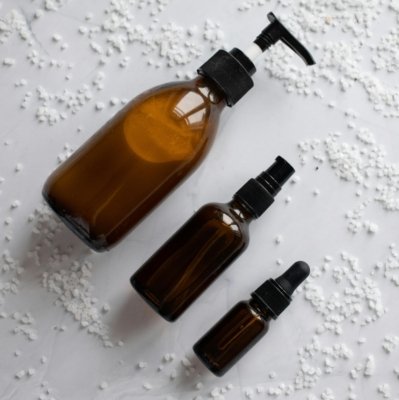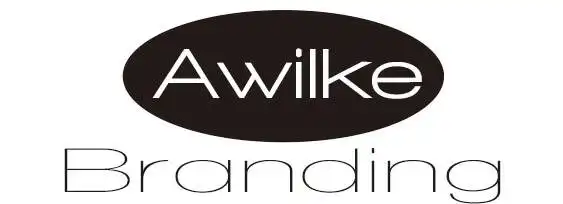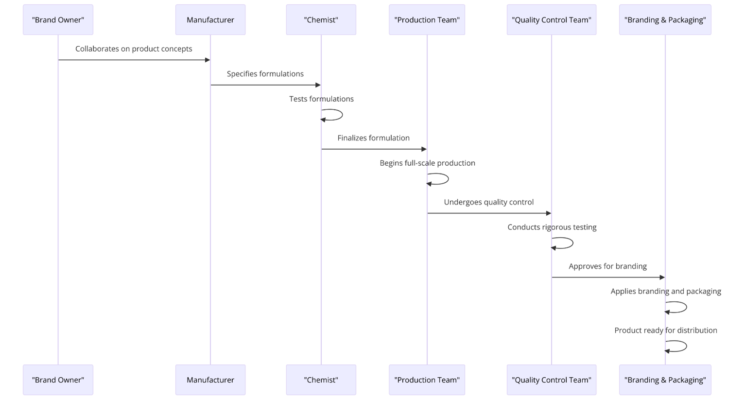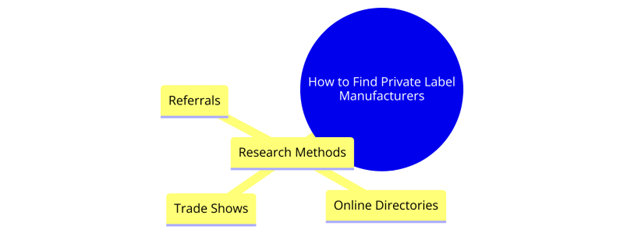Must-Have Skincare Ingredients for Your Skincare Brand
Must-Have Skincare Ingredients for Your Skincare Brand

Choosing the right skincare ingredients is key to your brand’s success. Today, consumers are more informed and selective about what they apply to their skin. This growing trend means brands must choose high-quality, effective ingredients to stay competitive.
So, how do you pick the best ingredients for your line? Let’s explore the must-have skincare ingredients that can elevate your brand and captivate your customers.
Hydration Heroes

1. Hyaluronic Acid
Hyaluronic acid is a must-have ingredient in the skincare industry. It stands out for its ability to deliver intense hydration and a plumping effect, making it a favorite among skincare enthusiasts. By partnering with a reliable manufacturer, you can ensure that your formulations are of the highest quality, meeting the needs of discerning customers.
-
Benefits:
- Intense hydration: Hyaluronic acid can hold up to 1,000 times its weight in water, making it incredibly effective at keeping skin moisturized.
- Plumping effect: This ingredient helps to smooth out fine lines and wrinkles, giving the skin a youthful, plump appearance.
- Suitable for all skin types: Whether your customers have dry, oily, or sensitive skin, hyaluronic acid works wonders without causing irritation.
-
Usage in Products:
- Serums: Hyaluronic acid serums are highly concentrated and penetrate deeply into the skin, providing maximum hydration.
- Moisturizers: When added to moisturizers, it enhances the product’s hydrating properties, making the skin feel soft and supple.
- Masks: Hyaluronic acid-infused masks offer a quick and intensive hydration boost, perfect for revitalizing tired, dry skin.
-
Consumer Appeal:
- Immediate effects: One of the key reasons consumers love hyaluronic acid is its ability to deliver instant moisture and visibly improve skin texture.
- Noticeable results: Regular use of hyaluronic acid leads to healthier, more hydrated skin, which is noticeable after just a few applications.
2. Squalane
Squalane is another essential ingredient that offers numerous benefits for skincare products, making it a standout choice for your brand. By choosing a top-tier manufacturer, you ensure your skincare line features premium squalane formulations that appeal to a broad range of customers.
-
Benefits:
- Lightweight hydration: Squalane provides excellent moisture without leaving a heavy or greasy feeling on the skin.
- Non-comedogenic: It won’t clog pores, making it ideal for those with acne-prone skin.
- Suitable for sensitive skin: Its gentle nature means it’s well-tolerated by all skin types, including sensitive skin.
-
Usage in Products:
- Facial oils: Squalane is often used in facial oils due to its ability to absorb quickly and provide lasting hydration.
- Moisturizers: Adding squalane to moisturizers enhances their hydrating properties without making them too heavy.
- Serums: It boosts the efficacy of serums, providing an extra layer of moisture and skin protection.
-
Consumer Appeal:
- Natural origin: Derived from natural sources like olives and sugarcane, squalane is a favorite among consumers looking for eco-friendly skincare options.
- Compatibility: Its universal compatibility with all skin types makes it a highly sought-after ingredient in skincare formulations.
Anti-Aging Allies

3. Retinol (Vitamin A)
Retinol is a powerhouse ingredient in the fight against aging, making it a crucial addition to any advanced skincare line. Partnering with a trusted manufacturer ensures you get the highest quality retinol formulations, helping your brand stand out in the competitive anti-aging market. This can drive customer loyalty and repeat purchases, contributing to your brand’s long-term success.
-
Benefits:
- Promotes cell turnover: Retinol accelerates skin cell renewal, helping to reveal fresher, more youthful skin.
- Reduces fine lines and wrinkles: It effectively diminishes the appearance of aging signs, giving the skin a smoother texture.
- Improves texture: Regular use leads to visibly improved skin texture and tone.
-
Usage in Products:
- Night creams: Retinol is best used in night creams where it can work overnight to renew the skin.
- Serums: High-potency retinol serums offer targeted anti-aging benefits.
- Anti-aging treatments: Specialized treatments leverage retinol’s powerful effects to combat signs of aging.
-
Consumer Appeal:
- Powerful reputation: Known as a gold-standard in anti-aging, retinol is trusted by dermatologists and consumers alike.
- Visible results: Users often see significant improvements in their skin’s appearance, boosting product satisfaction.
4. Peptides
Peptides are vital for maintaining skin’s youthful appearance and are highly valued in skincare formulations. By collaborating with a reliable manufacturer, you can ensure that your peptide formulations are top-notch, providing your customers with reliable and effective solutions.
-
Benefits:
- Stimulates collagen production: Peptides encourage the skin to produce more collagen, enhancing firmness and elasticity.
- Improves skin elasticity: They help maintain skin’s resilience and elasticity, reducing sagging.
- Reduces wrinkles: Regular use of peptides can diminish the appearance of fine lines and wrinkles.
-
Usage in Products:
- Serums: Peptide serums are highly effective for targeted anti-aging treatments.
- Eye creams: They help to reduce crow’s feet and under-eye wrinkles, offering a rejuvenated look.
- Anti-aging treatments: Peptides are often used in comprehensive anti-aging formulas for their powerful benefits.
-
Consumer Appeal:
- Scientifically backed: Peptides have strong scientific support, which builds consumer trust and confidence.
- Effective results: Users see noticeable improvements in skin firmness and reduction in wrinkles, leading to high satisfaction.
Brightening and Even-Toning

5. Vitamin C
Vitamin C is a powerhouse antioxidant that offers a range of benefits, making it an essential ingredient for brightening and protecting the skin. Incorporating Vitamin C into your private label skincare products can significantly boost their appeal and effectiveness. Partnering with a reputable manufacturer ensures your formulations are potent and reliable, helping your brand to stand out in the competitive skincare market.
-
Benefits:
- Brightens skin tone: Vitamin C helps to lighten dark spots and even out skin tone, giving a radiant complexion.
- Reduces hyperpigmentation: It effectively diminishes the appearance of dark spots and discoloration.
- Provides antioxidant protection: Vitamin C protects the skin from environmental damage caused by free radicals.
-
Usage in Products:
-
Consumer Appeal:
- Skin-brightening effects: Consumers love the immediate glow and long-term benefits Vitamin C offers.
- Antioxidant properties: Its ability to protect the skin from environmental stressors makes it highly sought after.
6. Alpha Arbutin
Alpha Arbutin is known for its gentle yet effective skin-brightening properties, making it a popular choice for addressing hyperpigmentation.
-
Benefits:
- Reduces hyperpigmentation: Alpha Arbutin effectively lightens dark spots and uneven skin tone.
- Evens out skin tone: It promotes a more uniform complexion, enhancing overall skin appearance.
-
Usage in Products:
- Serums: Alpha Arbutin serums are excellent for targeted treatment of dark spots.
- Spot treatments: It is highly effective in spot treatments for concentrated areas of pigmentation.
- Creams: Incorporating Alpha Arbutin in creams ensures even application and gradual improvement.
-
Consumer Appeal:
- Gentle yet effective: Consumers appreciate its gentle approach to brightening without causing irritation.
- Visible results: Regular use results in noticeable improvements in skin tone and clarity.
Adding Alpha Arbutin to your skincare line can provide your customers with a safe and effective solution for hyperpigmentation. Collaborating with a top manufacturer ensures that your products are formulated with the highest quality ingredients, boosting your brand’s credibility and customer satisfaction.
Exfoliation Experts

7. Salicylic Acid
Salicylic Acid is a staple ingredient for exfoliation and acne treatment, making it an essential component of any skincare line targeting these concerns.
-
Benefits:
- Exfoliates the skin: Salicylic acid penetrates deeply to exfoliate the skin, removing dead skin cells.
- Unclogs pores: It helps to clear out pores, reducing the occurrence of acne.
- Effective for acne treatment: Salicylic acid is widely recognized for its ability to treat and prevent acne.
-
Usage in Products:
- Cleansers: Salicylic acid cleansers effectively remove impurities and prevent breakouts.
- Spot treatments: These treatments target specific acne spots, reducing inflammation and speeding up healing.
- Exfoliating pads: Salicylic acid-infused pads provide convenient exfoliation and acne prevention.
-
Consumer Appeal:
- Acne-fighting abilities: Consumers trust salicylic acid for its proven effectiveness in managing acne.
- Pore-clearing action: Its ability to keep pores clear and prevent breakouts is highly valued.
Incorporating salicylic acid into your private label products can attract customers looking for reliable acne solutions. Working with a trusted manufacturer ensures your formulations are effective and of high quality, enhancing your brand’s reputation and customer loyalty.
8. Glycolic Acid
Glycolic acid is a powerful exfoliant that rejuvenates the skin, making it a key ingredient in many skincare products.
-
Benefits:
- Exfoliates: Glycolic acid removes dead skin cells, revealing smoother, brighter skin.
- Improves texture: It helps to refine skin texture, making it feel softer and look more even.
- Brightens complexion: Regular use of glycolic acid leads to a more radiant and youthful appearance.
-
Usage in Products:
- Toners: Glycolic acid toners gently exfoliate and prep the skin for further treatments.
- Peels: Professional peels with glycolic acid provide intensive exfoliation for dramatic results.
- Exfoliating masks: These masks offer a deep exfoliation treatment that revitalizes the skin.
-
Consumer Appeal:
- Effectiveness: Consumers appreciate glycolic acid for its powerful and visible results.
- Skin renewal: Its ability to renew the skin’s surface makes it a popular choice for anti-aging and brightening products.
Barrier Boosters

Barrier boosters are essential for maintaining healthy, resilient skin. Ceramides and Niacinamide (Vitamin B3) are two standout ingredients that support the skin’s natural barrier and address various skin concerns. Partnering with a reliable manufacturer ensures these ingredients are effectively incorporated into your products.
9. Ceramides
-
Benefits:
- Restores and maintains the skin’s natural barrier: Ceramides help to rebuild and protect the skin barrier, preventing moisture loss and environmental damage.
- Provides hydration: They keep the skin hydrated by locking in moisture, ensuring it stays soft and supple.
-
Usage in Products:
- Moisturizers: Ceramides in moisturizers provide long-lasting hydration and barrier protection.
- Creams: They enhance the nourishing properties of creams, making them more effective for dry or sensitive skin.
- Serums: Ceramide serums offer a concentrated boost to restore and maintain the skin barrier.
-
Consumer Appeal:
- Essential for maintaining skin health: Ceramides are crucial for keeping the skin barrier intact and functioning properly.
- Protecting against moisture loss: They help prevent dryness and irritation by sealing in moisture.
10. Niacinamide (Vitamin B3)
-
Benefits:
- Improves barrier function: Niacinamide strengthens the skin’s barrier, enhancing its ability to retain moisture and protect against irritants.
- Reduces redness: It helps to calm inflammation and reduce redness, making it ideal for sensitive skin.
- Minimizes pores: Niacinamide reduces the appearance of enlarged pores, giving the skin a smoother look.
-
Usage in Products:
- Serums: Niacinamide serums provide targeted treatment for improving skin texture and reducing redness.
- Moisturizers: When added to moisturizers, it enhances their calming and barrier-boosting properties.
- Treatments: Niacinamide treatments offer comprehensive care for various skin concerns, including acne and hyperpigmentation.
-
Consumer Appeal:
- Versatile ingredient: Suitable for various skin concerns, Niacinamide appeals to a broad range of consumers.
- Effective results: Its ability to improve skin health and appearance makes it highly valued.
Ensuring that your products contain high-quality niacinamide from reliable suppliers can set your brand apart. Working with a trusted manufacturer guarantees that your formulations are both potent and safe.
Natural and Soothing Ingredients

Natural and soothing ingredients like Aloe Vera and Tea Tree Oil are beloved for their gentle yet effective properties, making them perfect for sensitive and problematic skin. Collaborating with experienced manufacturers and suppliers ensures that these ingredients are sourced and processed to maintain their efficacy.
11. Aloe Vera
-
Benefits:
- Soothes and hydrates the skin: Aloe Vera provides immediate relief and hydration to irritated and dry skin.
- Anti-inflammatory properties: It helps to reduce inflammation and redness, promoting healing.
-
Usage in Products:
- Gels: Aloe Vera gels offer soothing hydration, ideal for post-sun exposure or irritated skin.
- Creams: Adding Aloe Vera to creams enhances their moisturizing and calming effects.
- Masks: Aloe Vera masks provide intensive hydration and soothing benefits, perfect for stressed skin.
-
Consumer Appeal:
- Calming and hydrating effects: Aloe Vera is known for its gentle, soothing properties, making it ideal for sensitive skin.
- Natural ingredient: Its natural origin appeals to consumers seeking eco-friendly and gentle skincare options.
12. Tea Tree Oil
-
Benefits:
- Antibacterial: Tea Tree Oil is effective in fighting bacteria, making it great for acne-prone skin.
- Effective for acne treatment: It helps to reduce acne and prevent future breakouts.
-
Usage in Products:
- Spot treatments: Tea Tree Oil spot treatments target acne, reducing inflammation and speeding up healing.
- Cleansers: Tea Tree Oil cleansers help to keep skin clear by fighting bacteria and unclogging pores.
- Masks: Masks with Tea Tree Oil provide deep cleansing and antibacterial benefits.
-
Consumer Appeal:
- Natural acne treatment: Tea Tree Oil is preferred for its natural approach to treating acne without harsh chemicals.
- Effective results: Its ability to combat acne and improve skin clarity is highly valued.
Sun Protection

Sun protection is crucial for maintaining healthy skin. Zinc Oxide is a top ingredient that provides broad-spectrum sun protection while being gentle on the skin. Working with trusted suppliers and manufacturers ensures your sun protection products are both effective and safe.
13. Zinc Oxide
-
Benefits:
- Provides broad-spectrum sun protection: Zinc Oxide protects against both UVA and UVB rays, offering comprehensive sun protection.
- Soothing properties: It is gentle on the skin, making it suitable for sensitive skin types.
-
Usage in Products:
- Sunscreens: Zinc Oxide is a key ingredient in sunscreens, providing reliable sun protection.
- Tinted moisturizers: Adding Zinc Oxide to tinted moisturizers offers both hydration and sun protection.
-
Consumer Appeal:
- Essential for effective sun protection: Consumers rely on Zinc Oxide for its proven sun-blocking abilities.
- Suitable for sensitive skin: Its gentle nature makes it a preferred choice for those with sensitive skin.
By continuing to incorporate these powerful ingredients, your private label skincare products will not only meet but exceed customer expectations. Collaborating with a trusted manufacturer like Awilke Branding guarantees high-quality formulations that keep your brand at the forefront of the industry.
Key Takeaway
Incorporating key skincare ingredients significantly boosts product appeal and effectiveness. Addressing hydration, anti-aging, brightening, exfoliation, and barrier protection meets diverse consumer needs.
Ingredients like hyaluronic acid, squalane, retinol, peptides, Vitamin C, alpha arbutin, salicylic acid, glycolic acid, ceramides, niacinamide, aloe vera, tea tree oil, and zinc oxide offer unique benefits and enhance customer satisfaction.
Partnering with Awilke Branding ensures your products have high-quality, effective, and safe formulations, leading to market success and loyal customers.
Insights for Business Owners Starting a Skincare Line
Understanding Market Trends
Stay updated with skincare trends to anticipate market demands. Trends like clean beauty, sustainable packaging, and natural ingredients are popular. Adapting to these trends keeps your brand relevant and competitive.
Product Differentiation
Differentiate your brand with unique formulations and ingredients. Highlight what sets your products apart, such as rare botanical extracts or innovative technology. This uniqueness can attract attention and build customer loyalty.
Effective Marketing Strategies
Promote your products with effective marketing strategies. Use social media, influencer partnerships, and content marketing to reach your audience. Create engaging content and use SEO to improve visibility. Personalized marketing enhances engagement and conversions.
Regulatory Compliance
Ensure your products meet industry standards and regulations. Compliance protects your brand and builds consumer trust. Partner with a reputable manufacturer to ensure your products are safe and compliant. Stay updated with evolving regulations to maintain compliance.
By focusing on these areas, business owners can successfully navigate the skincare industry. Partnering with Awilke Branding provides the support and expertise needed to bring your products to market.
Why Choose Awilke Branding?
Choosing the right partner for your private label skincare line is crucial to your success. Awilke Branding offers a range of benefits that make us the ideal choice for new and established brands alike.
Benefits of Partnering with Awilke Branding
- Low MOQ (Minimum Order Quantity): We understand that starting a new skincare line can be challenging. That’s why we offer low minimum order quantities, allowing you to test the market with less financial risk. This flexibility is perfect for emerging brands looking to grow gradually.
- Competitive Prices: Our competitive pricing ensures you get high-quality products without breaking the bank. We believe in providing value for money, helping you maximize your profits while offering premium skincare solutions to your customers.
- Trendy Formulations: Staying ahead in the skincare industry requires innovation. Our team is always up-to-date with the latest trends and advancements in skincare. We offer trendy formulations that cater to current consumer demands, ensuring your products are always in vogue.
- In-house R&D Team and Laboratory: Our in-house research and development team, along with our state-of-the-art laboratory, enables us to create unique and effective skincare formulations. This ensures that your products are not only high quality but also innovative and tailored to your brand’s specific needs.
- After-sale Services: Our commitment to your success doesn’t end once your products are delivered. We offer comprehensive after-sale services to support your business. Whether you need assistance with marketing strategies or product feedback, we are here to help.
Ready to take your skincare brand to the next level? Partner with Awilke Branding for unparalleled support and expertise in private label manufacturing. Contact us today to discuss your private label needs and discover how we can help bring your vision to life. Let’s create something amazing together.





















